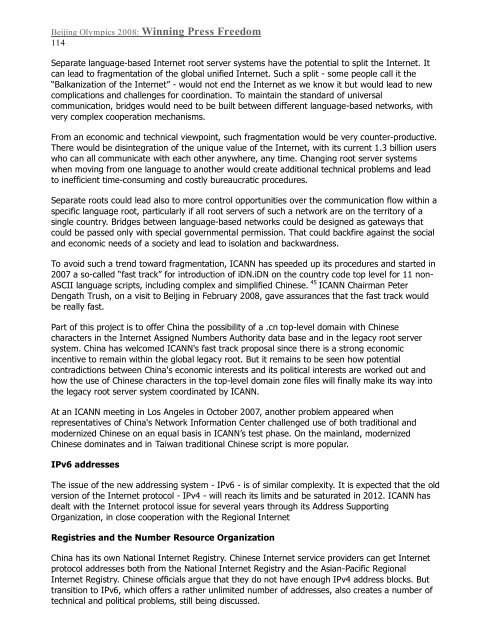Beijing Olympics 2008: Winning Press Freedom - World Press ...
Beijing Olympics 2008: Winning Press Freedom - World Press ...
Beijing Olympics 2008: Winning Press Freedom - World Press ...
Create successful ePaper yourself
Turn your PDF publications into a flip-book with our unique Google optimized e-Paper software.
<strong>Beijing</strong> <strong>Olympics</strong> <strong>2008</strong>: <strong>Winning</strong> <strong>Press</strong> <strong>Freedom</strong><br />
114<br />
Separate language-based Internet root server systems have the potential to split the Internet. It<br />
can lead to fragmentation of the global unified Internet. Such a split - some people call it the<br />
“Balkanization of the Internet” - would not end the Internet as we know it but would lead to new<br />
complications and challenges for coordination. To maintain the standard of universal<br />
communication, bridges would need to be built between different language-based networks, with<br />
very complex cooperation mechanisms.<br />
From an economic and technical viewpoint, such fragmentation would be very counter-productive.<br />
There would be disintegration of the unique value of the Internet, with its current 1.3 billion users<br />
who can all communicate with each other anywhere, any time. Changing root server systems<br />
when moving from one language to another would create additional technical problems and lead<br />
to inefficient time-consuming and costly bureaucratic procedures.<br />
Separate roots could lead also to more control opportunities over the communication flow within a<br />
specific language root, particularly if all root servers of such a network are on the territory of a<br />
single country. Bridges between language-based networks could be designed as gateways that<br />
could be passed only with special governmental permission. That could backfire against the social<br />
and economic needs of a society and lead to isolation and backwardness.<br />
To avoid such a trend toward fragmentation, ICANN has speeded up its procedures and started in<br />
2007 a so-called “fast track” for introduction of iDN.iDN on the country code top level for 11 non-<br />
ASCII language scripts, including complex and simplified Chinese. 45 ICANN Chairman Peter<br />
Dengath Trush, on a visit to <strong>Beijing</strong> in February <strong>2008</strong>, gave assurances that the fast track would<br />
be really fast.<br />
Part of this project is to offer China the possibility of a .cn top-level domain with Chinese<br />
characters in the Internet Assigned Numbers Authority data base and in the legacy root server<br />
system. China has welcomed ICANN's fast track proposal since there is a strong economic<br />
incentive to remain within the global legacy root. But it remains to be seen how potential<br />
contradictions between China's economic interests and its political interests are worked out and<br />
how the use of Chinese characters in the top-level domain zone files will finally make its way into<br />
the legacy root server system coordinated by ICANN.<br />
At an ICANN meeting in Los Angeles in October 2007, another problem appeared when<br />
representatives of China's Network Information Center challenged use of both traditional and<br />
modernized Chinese on an equal basis in ICANN’s test phase. On the mainland, modernized<br />
Chinese dominates and in Taiwan traditional Chinese script is more popular.<br />
IPv6 addresses<br />
The issue of the new addressing system - IPv6 - is of similar complexity. It is expected that the old<br />
version of the Internet protocol - IPv4 - will reach its limits and be saturated in 2012. ICANN has<br />
dealt with the Internet protocol issue for several years through its Address Supporting<br />
Organization, in close cooperation with the Regional Internet<br />
Registries and the Number Resource Organization<br />
China has its own National Internet Registry. Chinese Internet service providers can get Internet<br />
protocol addresses both from the National Internet Registry and the Asian-Pacific Regional<br />
Internet Registry. Chinese officials argue that they do not have enough IPv4 address blocks. But<br />
transition to IPv6, which offers a rather unlimited number of addresses, also creates a number of<br />
technical and political problems, still being discussed.





